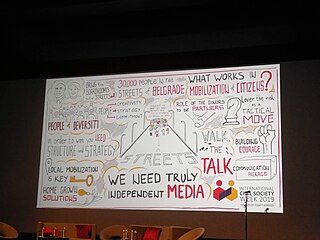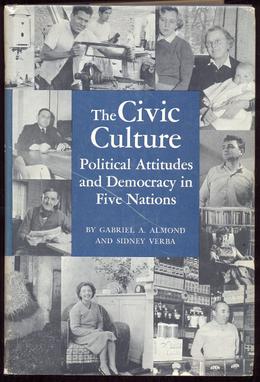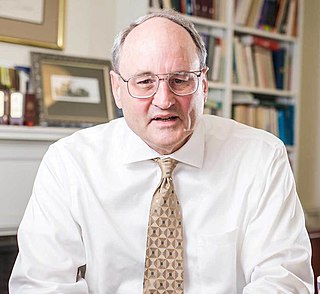See also
| Types of political culture | |
|---|---|
| Country-specific articles | |
A civic culture or civic political culture is a political culture characterized by "acceptance of the authority of the state" and "a belief in participation in civic duties". The term was first used in Gabriel Almond and Sidney Verba's book, The Civic Culture . [1] Civic political culture is a mixture of other political cultures namely parochial, subject and participant political cultures. [2] Almond and Verba characterised Britain as having a civic political culture. [3] In "Is Britain Still a Civic Culture?" Patrick Seyd and Paul Whiteley discuss the extent to which Britain can still be regarded as having a civic political culture. [4] The term civic culture is used to identify the political culture characteristics that explain the stability of a democratic society's political structure. [5]
Almond and Verba state that the following are characteristics of a civic culture: [6]
The proper combination of the various types of political culture will provide a culture that has a positive implication for the growth of democracy.
Right-wing politics is the range of political ideologies that view certain social orders and hierarchies as inevitable, natural, normal, or desirable, typically supporting this position based on natural law, economics, authority, property or tradition. Hierarchy and inequality may be seen as natural results of traditional social differences or competition in market economies.

Civil society can be understood as the "third sector" of society, distinct from government and business, and including the family and the private sphere. By other authors, civil society is used in the sense of 1) the aggregate of non-governmental organizations and institutions that advance the interests and will of citizens or 2) individuals and organizations in a society which are independent of the government.
In political science, a political system means the type of political organization that can be recognized, observed or otherwise declared by a state.

Citizen participation or public participation in social science refers to different mechanisms for the public to express opinions—and ideally exert influence—regarding political, economic, management or other social decisions. Participatory decision-making can take place along any realm of human social activity, including economic, political, management, cultural or familial.

E-democracy, also known as digital democracy or Internet democracy, uses information and communication technology (ICT) in political and governance processes. The term is credited to digital activist Steven Clift. By using 21st-century ICT, e-democracy seeks to enhance democracy, including aspects like civic technology and E-government. Proponents argue that by promoting transparency in decision-making processes, e-democracy can empower all citizens to observe and understand the proceedings. Also, if they possess overlooked data, perspectives, or opinions, they can contribute meaningfully. This contribution extends beyond mere informal disconnected debate; it facilitates citizen engagement in the proposal, development, and actual creation of a country's laws. In this way, e-democracy has the potential to incorporate crowdsourced analysis more directly into the policy-making process.

Political culture describes how culture impacts politics. Every political system is embedded in a particular political culture.
Technocracy is a form of oligarchy government in which the decision-makers are selected based on their expertise in a given area of responsibility, particularly with regard to scientific or technical knowledge. The experts in the technical details of specific issues, who presumably best understand both the problems at hand and how various technological redresses can improve the society at large. Technocracy follows largely in the tradition of other meritocracy theories and assumes full state control over political and economic issues. Technocracy bills itself as pragmatic, dispassionate and rational, free of the strife of political parties and factions as it pursues its optimal ends.

Civic engagement or civic participation is any individual or group activity addressing issues of public concern. Civic engagement includes communities working together or individuals working alone in both political and non-political actions to protect public values or make a change in a community. The goal of civic engagement is to address public concerns and promote the quality of the community.
Democratic consolidation is the process by which a new democracy matures, in a way that it becomes unlikely to revert to authoritarianism without an external shock, and is regarded as the only available system of government within a country. A country can be described as consolidated when the current democratic system becomes “the only game in town”, meaning no one in the country is trying to act outside of the set institutions. This is the case when: no significant political group seriously attempts to overthrow the democratic regime, the democratic system is regarded as the most appropriate way to govern by the vast majority of the public, and all political actors are accustomed to the fact that conflicts are resolved through established political and constitutional rules.
Active citizenship involves citizens having control over their daily lives as users of public services, allowing them to influence decisions, voice concerns, and engage with service provision. This includes both choice and voice, enabling citizens to impact service provision by participating in local policies, interacting with institutions, and expressing preferences. It encompasses activities in politics, workplaces, civil society, and private spheres. This concept emphasizes how citizens' interactions with staff, administrators, and politicians at different levels affect their ability to shape services according to their needs. Three dimensions are considered: choice, empowerment, and participation. Choice involves informed decisions about service use, empowerment allows individuals to control their lives as users, and participation includes engaging in policy processes and influencing services.
Ethnic democracy is a political system that combines a structured ethnic dominance with democratic, political and civil rights for all. Both the dominant ethnic group and the minority ethnic groups have citizenship and are able to fully participate in the political process. Ethnic democracy differs from ethnocracy in that elements of it are more purely democratic. It provides the non-core groups with more political participation, influence and improvement of status than ethnocracy supposedly does. Nor is an ethnic democracy a Herrenvolk democracy which is by definition a democracy officially limited to the core ethnic nation only.
Sidney Verba was an American political scientist, librarian and library administrator. His academic interests were mainly American and comparative politics. He was the Carl H. Pforzheimer University Professor at Harvard University and also served Harvard as the director of the Harvard University Library from 1984 to 2007.

Gabriel Abraham Almond was an American political scientist best known for his pioneering work on comparative politics, political development, and political culture.

The Civic Culture or The Civic Culture: Political Attitudes and Democracy in Five Nations is a 1963 political science book by Gabriel Almond and Sidney Verba. The book is credited with popularizing the political culture sub-field and is considered to be the first systematic study in this field.
A hybrid regime is a type of political system often created as a result of an incomplete democratic transition from an authoritarian regime to a democratic one. Hybrid regimes are categorized as having a combination of autocratic features with democratic ones and can simultaneously hold political repressions and regular elections. Hybrid regimes are commonly found in developing countries with abundant natural resources such as petro-states. Although these regimes experience civil unrest, they may be relatively stable and tenacious for decades at a time. There has been a rise in hybrid regimes since the end of the Cold War.
Civic technology, or civic tech, enhances the relationship between the people and government with software for communications, decision-making, service delivery, and political process. It includes information and communications technology supporting government with software built by community-led teams of volunteers, nonprofits, consultants, and private companies as well as embedded tech teams working within government.
Politics and technology encompasses concepts, mechanisms, personalities, efforts, and social movements that include, but are not necessarily limited to, the Internet and other information and communication technologies (ICTs). Scholars have begun to explore how internet technologies influence political communication and participation, especially in terms of what is known as the public sphere.

Henry E. Brady is an American political scientist specializing in methodology and its application in a diverse array of political fields. He is Dean of the Goldman School of Public Policy at University of California, Berkeley and holds the Class of 1941 Monroe Deutsch Professor of Political Science and Public Policy. He was elected President of the American Political Science Association, 2009–2010, giving a presidential address entitled "The Art of Political Science: Spatial Diagrams as Iconic and Revelatory." He has published academic works on diverse topics, co-authoring with colleagues at a variety of institutions and ranks, as well as many solo authored works. His principal areas of research are on political behavior in the United States, Canada, and the former Soviet Union, public policy and methodological work on scaling and dimensional analysis. When he became President of the American Political Science Association, a number of his colleagues and co-authors contributed to his presidential biography entitled "Henry Brady, Big Scientist," discussing his work and the fields to which he has contributed and has also shaped.
Kay Lehman Schlozman is an American political scientist, currently the J. Joseph Moakley Professor of Political Science at Boston College. Schlozman has made fundamental advancements to the study of participation in American politics, and was a pioneer in the field of gender and politics. Her contributions include the theory of civic voluntarism, several landmark studies on the relationship between access to resources and different types of political participation, and related investigations into the nature of civic culture. Schlozman has one of the highest citation counts of any political scientist, including being among the top 50 most cited active political scientists and top 10 most cited women in the discipline. She worked closely with Sidney Verba for nearly 50 years, first as his student and then as his collaborator.
Oral democracy is a talk-based form of government and political system in which citizens of a determined community have the opportunity to deliberate, through direct oral engagement and mass participation, in the civic and political matters of their community. Additionally, oral democracy represents a form of direct democracy, which has the purpose of empowering citizens by creating open spaces that promote an organized process of discussion, debate, and dialogue that aims to reach consensus and to impact policy decision-making. Political institutions based on this idea of direct democracy seek to decrease the possibilities of state capture from elites by holding them accountable, to encourage civic participation and collective action, and to improve the efficiency and adaptability of development interventions and public policy implementation.